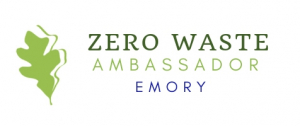Coronavirus Plastic Crusade: Fight it, Don’t Join It
By Davida Halev, Senior in Emory College, Sociology Major and Sustainability Minor
COVID-19 has reinvigorated plastic consumption and production in industry and in our personal lives. Drop in petroleum prices and lifestyle changes – specifically, increased demand for personal protective equipment (PPE) and single-use plastics (SUPs) – have spurred this phenomenon and the implications are dire.
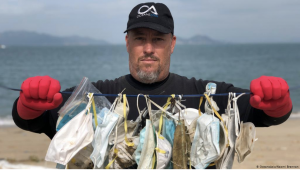
Wearing masks in public settings is essential for minimizing the spread of the coronavirus (CDC, 2020). Global demands have generated a large increase in cheap, disposable masks made with synthetic plastic fibers. If everyone in the world who needed to wear a single-use mask – i.e. those without preexisting health conditions who are out in public – 129 billion face masks would be sent to landfill every month (Prata et al. 2020). Of these mask-wearers, if just 1% of them missed the trash can, 8,8185 pounds of contaminated plastic litter would litter the land and watersheds each month. Even worse, anecdotal evidence implies this actual number is much higher. Although many with good intentions dispose of masks correctly via trash bins, disposable masks are light enough to blow away (Prata et al. 2020; WWF, 2020). Photos of drowned plastic masks in oceans and streets lined with littered masks portray the problem.
Today, masks are essential for public health and reusable masks are essential for environmental health. Wearing reusable masks can help stop the spread of coronavirus and avoid creating waste sent to landfills. You can buy a new reusable mask – OR you can be the ultimate zero-waste warrior. Make your own mask to repurpose your fabric, save money and have some arts-and-crafts fun while you’re at it. Here is a quick and easy tutorial for making your own mask out of materials you can find from around the home:
Making your own No-Sew Mask
- Gather your materials. You’ll need a washable fabric cut about 20” x 20” and two rubber bands or hair ties. Try looking for an old t-shirt, scarf, sarong, or bandana. You’ll need scissors if you’re cutting your own!
- Fold your cloth in half. Make sure your material is washable and breathable.
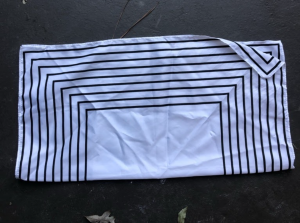
- Fold your cloth again in thirds. Fold the top down and the bottom up so you have enough width to cover your mouth and nose.
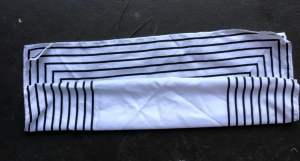
- Cinch your sides. Take two rubber bands or hair ties (or one of each!) and place them around 6 inches into the fabric.
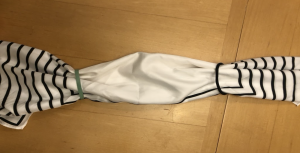
- Fold the outside flaps into the center. Tuck each side so it has no wiggle room to move about!
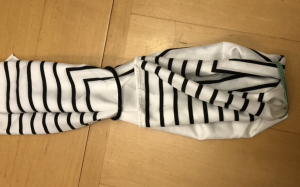
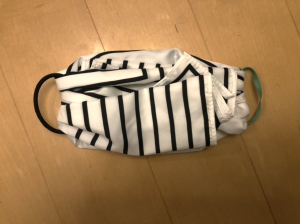
- Make sure your mask fits properly. Wrap the ties around your ears and adjust them to make sure it lies snugly but comfortably on your face.
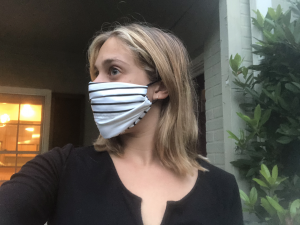
Et Voila! Your mask is ready to wear, featuring you as a zero-waste warrior and your funky t-shirt or bandana repurposed for good.
When making your own mask, make sure:
- Your fabric has at least two layers
- It fits snugly around your face, covering your nose and mouth
- You wash your mask frequently
Many online and in-store retailers sell reusable masks. Caraa is one such company, who sells fabric masks and matches each purchase to fundraise for masks for those without. Haley Solar uses repurposed fabrics and locally sourced material to make her own. If you can’t find one around in Atlanta, shop on Etsy, a platform working to provide local artists with opportunities.
What kinds of reusable fabric masks have you up-cycled for the virus? Let me know in the comments below!
References
Adyel, Tanveer M. 2020. “Accumulation of Plastic Waste during COVID-19.” Science 369(6509):1314–15. doi: 10.1126/science.abd9925.
CDC. 2020. “Coronavirus Disease 2019 (COVID-19).” Centers for Disease Control and Prevention. Retrieved November 1, 2020 (https://www.cdc.gov/coronavirus/2019-ncov/prevent-getting-sick/cloth-face-cover-guidance.html, https://www.cdc.gov/coronavirus/2019-ncov/prevent-getting-sick/how-to-make-cloth-face-covering.html).
Patrício Silva, Ana L., Joana C. Prata, Tony R. Walker, Armando C. Duarte, Wei Ouyang, Damià Barcelò, and Teresa Rocha-Santos. 2021. “Increased Plastic Pollution Due to COVID-19 Pandemic: Challenges and Recommendations.” Chemical Engineering Journal 405:126683. doi: 10.1016/j.cej.2020.126683.
World Wildlife Fund, Italy. “Responsibility is required when disposing of masks and gloves | WWF Italy,” April 23, 2020. https://www.wwf.it/scuole/?53500%2FNello-smaltimento-di-mascherine-e-guanti-serve-responsabilita.

